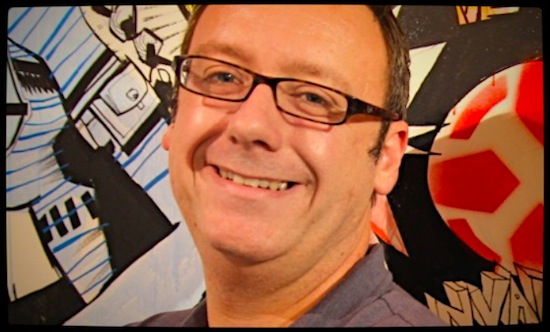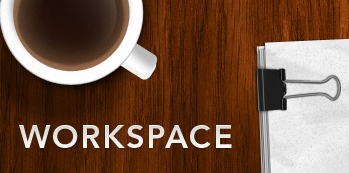
Who are you and what do you write?
—-
My name is Gary Whitta ([@garywhitta](http://twitter.com/garywhitta)). I started out as a journalist and editor in the video game industry; I edited PC Gamer magazine from 1993-2000 before starting a new career as a screenwriter.
I wrote the Denzel Washington movie [The Book of Eli](http://www.imdb.com/title/tt1037705/). I’ve written on projects like the live-action feature adaptations of Akira and World of Warcraft. My next movie, set to star Will and Jaden Smith, directed by M. Night Shyamalan, goes into production early next year for release in Summer 2013. I’m currently working on an animated feature for Paramount, and recently signed a TV development deal with ABC Studios. I’m working on some comic-book projects.
I also got to play a zombie in the pilot episode of The Walking Dead, which was pretty cool.
Where and when do you write?
—-
 I work from home, in a spare bedroom converted into a quasi-office. I’m usually at my computer by 8:30 each morning but spend an hour or so catching up on news, social media stuff and generally procrastinating before knuckling down to work. Sometimes I’ll manage to blow off the whole morning but then guilt sets in after lunch and so the afternoon tends to be when I get most of my actual work done. I’m easily distracted so if I really need to concentrate I’ll turn off everything that can bleep/bing/flash at me (email, twitter, IM, etc) and go into full-screen mode on my writing program so I’m properly blinkered.
I work from home, in a spare bedroom converted into a quasi-office. I’m usually at my computer by 8:30 each morning but spend an hour or so catching up on news, social media stuff and generally procrastinating before knuckling down to work. Sometimes I’ll manage to blow off the whole morning but then guilt sets in after lunch and so the afternoon tends to be when I get most of my actual work done. I’m easily distracted so if I really need to concentrate I’ll turn off everything that can bleep/bing/flash at me (email, twitter, IM, etc) and go into full-screen mode on my writing program so I’m properly blinkered.
When actually writing the first draft of a new script my over/under is five pages per day — anything less, I’ll feel like I slacked off, anything more is gravy. At five pages per weekday, you’ve got a 120-page script in about five weeks, which is pretty decent. When I’m really consumed with what I’m writing it can be much more — the first draft of The Book of Eli was written in less than a week, writing well into the night, blasting out about 20 pages per day.
Those are the rare good times; more commonly each page is like pulling teeth and just making my “daily 5″ is a victory.
A daily quota is harder to quantify when outlining or rewriting. If you’re honest with yourself you just instinctively know at the end of each day if you’re satisfied with how much you got done. Particularly when rewriting you can work hard all day, coming at a problematic scene ten different ways, and still wind up back where you started. On those days I don’t beat myself up too much because at least I know I worked hard, but it’s still frustrating if you feel like you didn’t make any meaningful progress.
I know a lot of writers like to have music playing when they work but I find it a distraction usually. I need a quiet environment to work, although in some cases — mostly in the early stages of a project when I’m still feeling out the feel and tone of a piece — I’ll make an appropriate playlist of music that takes me to those places. When I was writing The Book of Eli I listened to a lot of gospel and devotional music — Sam Cooke and the Soul Stirrers, Johhny Cash, stuff like that.
I’ll also put that stuff on my iPod and listen to it in the car, I find that immersing myself in music that evokes the atmosphere of the piece I’m working on really helps me.
What hardware do you use?
—–
I’m an Apple guy through and through. My main desktop work machine is a 27″ iMac and I take an 11” MacBook Air with me when I travel. I also use an iPad which has become an indispensable tool when pitching. I create PDF “flash cards” in [Pages](http://www.apple.com/iwork/pages/) that I can easily swipe through with the iPad on my knee as I’m sat there pitching to someone. I write just enough information that I don’t get lost or trail off, but not so much that it feels like I’m just reading off a script.
I also use my iPad for reading scripts that are sent my way as well as comics and other things sent for consideration to adapt/rewrite. Almost everything is a PDF these days. The iPad really is an amazingly versatile device and it’s already hard to imagine what being a screenwriter without one was like.
I also have a pretty capable gaming PC under my same desk, which is hooked up to my iMac in target display mode so it’s easy to switch over when I want to play games. Which is pretty much all the time that I’m writing.
What software do you use?
—–
Like most screenwriters I use [Final Draft](http://www.finaldraft.com/). And like John, I don’t love it.
It’s just what I’ve always used and I’m too set in my ways to learn something new. It works well enough despite its sometimes annoying quirks and it is the closest thing there is to an industry standard, although these days all you really need is something that will properly output PDFs (until you actually go into serious development/pre-production at which point they will want you to give them editable Final Draft files).
For general writing I use Apple’s Pages, which is a very elegant and simple word processor, and it comes with a full-screen mode that eliminates distraction. If you’re looking for something free on Mac, WriteRoom does a similar job.
I’m pretty much within the Apple ecosystem for everything else, too. I use Apple Mail and iCal synced to my iPhone via iCloud which is pretty idiot-proof and therefore perfect for me.
I had a serious hard drive crash several years ago and it really was a big wake-up call on the importance of backing up. Now everything gets backed up to my [Time Capsule](http://www.apple.com/timecapsule/) hourly every day, and I keep important work files both in my Dropbox (which is the greatest thing ever) and iCloud.
What would you change about how you write?
—-
Despite all the devices and tricks I’ve developed to minimize procrastination I still do it more than I’d like. The great thing about this job is that you can keep your own hours so long as the project is turned in on time (and it’s good) but the flipside is it’s so easy to decide the kitchen really needs cleaning instead because WRITING IS HARD and there’s no-one there to keep you honest.
For that reason I’ve recently found myself more attracted to collaborative writing, because two brains are always better than one (provided they’re in sync), and just the presence of that second person forces you to keep up your end. It’s okay for me to waste my own time, but not someone else’s. Plus there’s an energy and fun to collaboration that you just don’t get when you’re writing by yourself, wearing out the carpet as you pace up and down trying to crack a story problem and convincing yourself that you’re a fraud who will be found out the minute you hand in this next script.